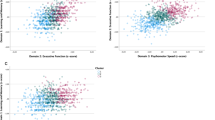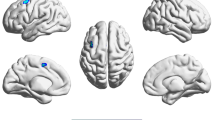Abstract
Chronic benzodiazepine use is common in patients with mental illness and is associated with cognitive impairment. It is unclear whether benzodiazepine-induced cognitive impairment is reversible. Amelioration of cognitive dysfunction may be facilitated during benzodiazepine tapering by add-on melatonin due to its anti-inflammatory and neuroprotective properties. We examined how melatonin and benzodiazepine withdrawal affect cognition, subjective well-being, and psychosocial functioning. Eighty patients with schizophrenia or bipolar disorder were randomized to add-on treatment once daily with either prolonged-release melatonin or placebo in a 24-week, double-blind clinical trial. All participants gradually tapered usual benzodiazepine dosage in a closely monitored treatment setting. We used the Brief Assessment of Cognition in Schizophrenia (BACS) to assess neurocognitive performance with additional assessments of subjective well-being and psychosocial functioning. BACS composite and subscale scores (except motor speed) significantly improved in parallel with benzodiazepine dose reduction, but there was no additional effect of melatonin. Cognitive performance was still markedly impaired post-tapering compared with normative data. Neither benzodiazepine withdrawal nor treatment group affected subjective well-being or psychosocial functioning. In conclusion, add-on melatonin does not seem to affect cognition, well-being, or psychosocial functioning in patients with severe mental illness. The observed improvement in cognitive performance could not be distinguished from retest effects, which may in turn have been facilitated by the benzodiazepine tapering.
Similar content being viewed by others
References
Keefe RS, Goldberg TE, Harvey PD, Gold JM, Poe MP, Coughenour L (2004) The Brief Assessment of Cognition in Schizophrenia: reliability, sensitivity, and comparison with a standard neurocognitive battery. Schizophr Res 68(2–3):283–297
Irani F, Kalkstein S, Moberg EA, Moberg PJ (2011) Neuropsychological performance in older patients with schizophrenia: a meta-analysis of cross-sectional and longitudinal studies. Schizophr Bull 37(6):1318–1326
Mesholam-Gately RI, Giuliano AJ, Goff KP, Faraone SV, Seidman LJ (2009) Neurocognition in first-episode schizophrenia: a meta-analytic review. Neuropsychology 23(3):315–336
Keefe RS (2014) The longitudinal course of cognitive impairment in schizophrenia: an examination of data from premorbid through posttreatment phases of illness. J Clin Psychiatry 75(Suppl 2):8–13
Kurtz MM, Gerraty RT (2009) A meta-analytic investigation of neurocognitive deficits in bipolar illness: profile and effects of clinical state. Neuropsychology 23(5):551–562
Harvey PD, Bowie CR (2012) Cognitive enhancement in schizophrenia: pharmacological and cognitive remediation approaches. Psychiatr Clin North Am 35(3):683–698
Tannenbaum C, Paquette A, Hilmer S, Holroyd-Leduc J, Carnahan R (2012) A systematic review of amnestic and non-amnestic mild cognitive impairment induced by anticholinergic, antihistamine‚ GABAergic and opioid drugs. Drugs Aging 29(8):639–658
Barker MJ, Greenwood KM, Jackson M, Crowe SF (2004) Cognitive effects of long-term benzodiazepine use: a meta-analysis. CNS Drugs 18(1):37–48
Stewart SA (2005) The effects of benzodiazepines on cognition. J Clin Psychiatry 66(Suppl 2):9–13
Barker MJ, Greenwood KM, Jackson M, Crowe SF (2004) Persistence of cognitive effects after withdrawal from long-term benzodiazepine use: a meta-analysis. Arch Clin Neuropsychol 19(3):437–454
de Billioti GS, Begaud B, Bazin F, Verdoux H, Dartigues JF, Peres K, Kurth T, Pariente A (2012) Benzodiazepine use and risk of dementia: prospective population based study. BMJ 345:e6231
de Billioti GS, Moride Y, Ducruet T, Kurth T, Verdoux H, Tournier M, Pariente A, Begaud B (2014) Benzodiazepine use and risk of Alzheimer’s disease: case-control study. BMJ 349:g5205
Gallacher J, Elwood P, Pickering J, Bayer A, Fish M, Ben-Shlomo Y (2012) Benzodiazepine use and risk of dementia: evidence from the Caerphilly Prospective Study (CaPS). J Epidemiol Community Health 66(10):869–873
Wu CS, Wang SC, Chang IS, Lin KM (2009) The association between dementia and long-term use of benzodiazepine in the elderly: nested case-control study using claims data. Am J Geriatr Psychiatry 17(7):614–620
Bocti C, Roy-Desruisseaux J, Roberge P (2012) Research paper most likely shows that benzodiazepines are used to treat early symptoms of dementia. BMJ 345:e7986
Srinivasan V, Pandi-Perumal SR, Trahkt I, Spence DW, Poeggeler B, Hardeland R, Cardinali DP (2009) Melatonin and melatonergic drugs on sleep: possible mechanisms of action. Int J Neurosci 119(6):821–846
Maldonado MD, Reiter RJ, Perez-San-Gregorio MA (2009) Melatonin as a potential therapeutic agent in psychiatric illness. Hum Psychopharmacol 24(5):391–400
Khandaker GM, Cousins L, Deakin J, Lennox BR, Yolken R, Jones PB (2015) Inflammation and immunity in schizophrenia: implications for pathophysiology and treatment. Lancet Psychiatry 2(3):258–270
Anderson G, Maes M (2012) Melatonin: an overlooked factor in schizophrenia and in the inhibition of anti-psychotic side effects. Metab Brain Dis 27(2):113–119
Baandrup L, Lindschou J, Winkel P, Gluud C, Glenthoj BY (2015) Prolonged-release melatonin versus placebo for benzodiazepine discontinuation in patients with schizophrenia or bipolar disorder: a randomised, placebo-controlled, blinded trial. World J Biol Psychiatry. doi:10.3109/15622975.2015.1048725
Baandrup L, Fagerlund B, Jennum P, Lublin H, Hansen JL, Winkel P, Gluud C, Oranje B, Glenthoj BY (2011) Prolonged-release melatonin versus placebo for benzodiazepine discontinuation in patients with schizophrenia: a randomized clinical trial—the SMART trial protocol. BMC Psychiatry 11:160
Reflection paper on the regulatory guidance for the use of health-related quality of life (HRQL) measures in the evaluation of medicinal products. 2006. London: EMEA
Draft guidance for industry. Patient-reported outcomes measures: use in medical product development to support labeling claims. 2006. Rockville, MD: FDA Federal Register
Bech P, Olsen LR, Kjoller M, Rasmussen NK (2003) Measuring well-being rather than the absence of distress symptoms: a comparison of the SF-36 Mental Health subscale and the WHO-Five Well-Being Scale. Int J Methods Psychiatr Res 12(2):85–91
Naber D, Moritz S, Lambert M, Pajonk FG, Holzbach R, Mass R, Andresen B (2001) Improvement of schizophrenic patients’ subjective well-being under atypical antipsychotic drugs. Schizophr Res 50(1–2):79–88
Morosini PL, Magliano L, Brambilla L, Ugolini S, Pioli R (2000) Development, reliability and acceptability of a new version of the DSM-IV Social and Occupational Functioning Assessment Scale (SOFAS) to assess routine social functioning. Acta Psychiatr Scand 101(4):323–329
Lingjaerde O, Ahlfors UG, Bech P, Dencker SJ, Elgen K (1987) The UKU side effect rating scale. A new comprehensive rating scale for psychotropic drugs and a cross-sectional study of side effects in neuroleptic-treated patients. Acta Psychiatr Scand Suppl 334:1–100
Kay SR, Fiszbein A, Opler LA (1987) The positive and negative syndrome scale (PANSS) for schizophrenia. Schizophr Bull 13(2):261–276
Manda K, Reiter RJ (2010) Melatonin maintains adult hippocampal neurogenesis and cognitive functions after irradiation. Prog Neurobiol 90(1):60–68
Lin L, Huang QX, Yang SS, Chu J, Wang JZ, Tian Q (2013) Melatonin in Alzheimer’s disease. Int J Mol Sci 14(7):14575–14593
Jansen SL, Forbes DA, Duncan V, Morgan DG (2006) Melatonin for cognitive impairment. Cochrane Database Syst Rev 1:CD003802
Kitajima R, Miyamoto S, Tenjin T, Ojima K, Ogino S, Miyake N, Fujiwara K, Funamoto Y, Arai J, Tsukahara S, Ito Y, Tadokoro M, Anai K, Kaneda Y, Yamaguchi N (2012) Effects of tapering of long-term benzodiazepines on cognitive function in patients with schizophrenia receiving a second-generation antipsychotic. Prog Neuropsychopharmacol Biol Psychiatry 36(2):300–306
Wolkowitz OM, Pickar D (1991) Benzodiazepines in the treatment of schizophrenia: a review and reappraisal. Am J Psychiatry 148(6):714–726
Dold M, Li C, Tardy M, Khorsand V, Gillies D, Leucht S (2012) Benzodiazepines for schizophrenia. Cochrane Database Syst Rev 11:CD006391
Keefe RS, Malhotra AK, Meltzer HY, Kane JM, Buchanan RW, Murthy A, Sovel M, Li C, Goldman R (2008) Efficacy and safety of donepezil in patients with schizophrenia or schizoaffective disorder: significant placebo/practice effects in a 12-week, randomized, double-blind, placebo-controlled trial. Neuropsychopharmacology 33(6):1217–1228
Goldberg TE, Keefe RS, Goldman RS, Robinson DG, Harvey PD (2010) Circumstances under which practice does not make perfect: a review of the practice effect literature in schizophrenia and its relevance to clinical treatment studies. Neuropsychopharmacology 35(5):1053–1062
Keefe RS, Harvey PD, Goldberg TE, Gold JM, Walker TM, Kennel C, Hawkins K (2008) Norms and standardization of the Brief Assessment of Cognition in Schizophrenia (BACS). Schizophr Res 102(1–3):108–115
Acknowledgments
The trial was funded by the Research Fund of the Mental Health Services of the Capital Region of Denmark via a postdoc grant and a grant for external randomization and database management. Further funding was obtained from Axel Thomsen and Martha Thomsen’s Foundation. The Lundbeck Foundation Center of Clinical Intervention and Neuropsychiatric Schizophrenia Research covered residual expenses. The funding bodies had no role in trial design or in the collection, analysis, and interpretation of data.
Author information
Authors and Affiliations
Corresponding author
Ethics declarations
Conflict of interest
The authors declare that they have no conflict of interest.
Ethical standards
This trial was approved by the Committee on Biomedical Research Ethics of The Capital Region in Denmark (H-1-2011-025), the Danish Medicines Agency (EudraCT 2010-024065-46), and the Danish Data Protection Agency (RHP-2011-07: 01217) and was registered at ClinicalTrials.gov (NCT01431092). The authors confirm that all procedures contributing to this work comply with the ethical standards of the relevant national and institutional committees on human experimentation and with the Helsinki Declaration of 1975, as revised in 2008. All participants provided written informed consent.
Rights and permissions
About this article
Cite this article
Baandrup, L., Fagerlund, B. & Glenthoj, B. Neurocognitive performance, subjective well-being, and psychosocial functioning after benzodiazepine withdrawal in patients with schizophrenia or bipolar disorder: a randomized clinical trial of add-on melatonin versus placebo. Eur Arch Psychiatry Clin Neurosci 267, 163–171 (2017). https://doi.org/10.1007/s00406-016-0711-8
Received:
Accepted:
Published:
Issue Date:
DOI: https://doi.org/10.1007/s00406-016-0711-8




